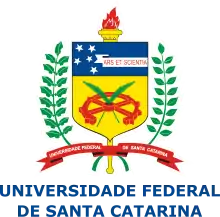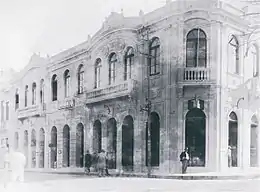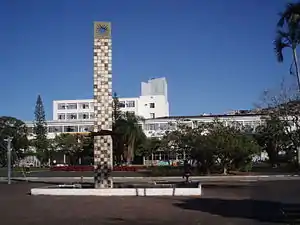Federal University of Santa Catarina
The Federal University of Santa Catarina (Portuguese: Universidade Federal de Santa Catarina, UFSC) is a public university in Florianópolis, the capital city of Santa Catarina in southern Brazil.
Universidade Federal de Santa Catarina | |
 | |
Other names | UFSC |
|---|---|
| Motto | Ars et Scientia |
Motto in English | Arts and Science |
| Type | Public |
| Established | 1960 |
| Rector | Ubaldo César Balthazar |
Administrative staff | 4,539 |
| Undergraduates | 29,595 |
| Postgraduates | 14,233 |
| Location | , , |
| Campus | Urban |
| Website | www |
Considered one of the leading universities in Brazil, UFSC is the 9th best university in Latin America in the ranking of Times Higher Education; the 22nd by QS World University Rankings, and was ranked as the 10th best institution of higher education in Latin America by the Webometrics Ranking of World Universities. In the annual ranking of the Brazilian newspaper Folha de São Paulo, it is the 6th best Brazilian university, with a most courses being among the ten best in the country.[1][2][3][4][5]
The structure of its campus comprises 11 Academic Schools (Centros de Ensino), divided by field of study. Every School is divided in departments, the largest one being the Department of Mechanical Engineering. The oldest school at UFSC is the School of Law. The Department of Law was the first of UFSC's departments to be officially recognized in 1932.
History

The history of the Federal University of Santa Catarina has its roots in the Polytechnic Institute of Florianópolis founded on March 13 of 1917 by José Arthur Boiteux. Organized as a free institute, it was the first college degree institution of Santa Catarina state. On February 11, 1932 the Law School was incorporated, officially in 1935.

That triggered a movement to start the first state university and on December 18, of 1960 it became the University of Santa Catarina, offering the courses of Law, Medicine, Pharmacy, Philosophy, Economics, Social Service and the School of Industrial Engineering. On July 15, 1968, as an effort of Brazilian government to improve college education in Brazil with education reform, the major universities in Brazil were reorganized in Schools and Departments and acquired a new education structure, more resembling the American and English methodology. Since then the university became the Federal University of Santa Catarina.
In 1961 the institution has earned a new place in the city to build its structure, located in the region of Trindade near downtown Florianópolis. The area was previously occupied by a model farm called Assis-Brasil and is located near the coast, having several streams crossing the actual campus. The moving was finished in 1980.
A young university, the Federal University of Santa Catarina continues to grow. During the 1980s, it began to invest heavily in the expansion of graduate programs and research, besides supporting the creation of technology centers in the state of Santa Catarina and the development of a number of outreach projects for the community. Today, UFSC has four other campuses distributed in the cities of Araranguá, Blumenau, Curitibanos and Joinville.[6]
Admissions
The Universidade Federal de Santa Catarina undergraduate admission process is almost similar to all others in Brazil, using a process called vestibular. It is comprised by several written tests usually performed in 2–3 days. The competition is fierce and the percentage of successful applicants is usually lower than 15% (12,6% in 2018's process[7]). In 2007 the institution approved the Affirmative Action quota system proposed by the Ministry of Education in early Luis Inácio Lula da Silva government, which now reserves 50% of the spots for incoming students available to students coming from public schools and racial minorities.
The admission process for graduate school is more complex and usually involves a test and a recommendation from the previous college. People interested in graduate degrees at UFSC should contact the department of the intended program directly. The Brazilian Ministry of Education, through CAPES (Coordenação de Aperfeiçoamento de Pessoal do Nível Superior, Superior Level Personnel Enhancement Coordination) evaluates graduate programs in Brazil every three years, ranking them from 1 (worst) to 7, being 6 excellence and 7 international excellence level.
The following graduate programs at UFSC have received grades 6 or 7, as per the last CAPES evaluation (2013):[8]
- Aquaculture
- Chemical Engineering
- Chemistry
- Civil Engineering
- Electrical Engineering
- Food Engineering
- Food Science
- Interdisciplinary Studies in Human Sciences
- Law
- Linguistics
- Mechanical Engineering
- Materials Science and Engineering
- Nursing
- Plant Genetic Resources
- Pharmacology
- Philosophy
- Scientific and Technological Education
Numbers
.JPG.webp)
2016 numbers, provided by the institution.
- 119 undergraduate programs;
- 82 Master's degree programs;
- 55 Doctoral degree programs;
- 45,006 students (total);
- 2,670 professors;
- 3,242 administrative staff.
Academic schools

- School of Agricultural Sciences – CCA
- School of Biological Sciences – CCB
- School of Communication and Arts – CCE
- School of Education – CED
- School of Health Sciences – CCS
- School of Law – CCJ
- School of Philosophy and Human Sciences – CFH
- School of Physical and Mathematical Sciences – CFM
- School of Sports – CDS
- School of Socio-Economic Sciences – CSE
- School of Technology – CTC
Notable faculty
- Alvaro Toubes Prata, professor of Mechanical Engineering, member of the Brazilian Academy of Sciences
- Sergio Colle, professor of Mechanical Engineering, member of the National Academy of Engineering
- Helena Amélia Oehler Stemmer civil engineer
Notable alumni
- Gean Loureiro, mayor of Florianópolis
- Dário Berger, senator and former mayor of Florianópolis
- Angela Amin, former mayor of Florianópolis
- Esperidião Amin, former governor of Santa Catarina
- Luiz Henrique da Silveira, former governor of Santa Catarina
- Manoel Dias, former Brazilian Minister of Labor
- Zeca Pires, filmmaker
- Lourenço Sant'Anna, executive producer
- João Nílson Zunino, former president of Avaí FC and pathologist
- Sônia Bridi, journalist and former international correspondent of Rede Globo
Rankings and reputation
| University rankings | |
|---|---|
| Global – Overall | |
| QS World[9] | 751-800 (2019) |
| THE World[10] | 801–1000 (2019) |
| USNWR Global[11] | 597 (2019) |
References
- "Latin America University Rankings 2017". Times Higher Education (THE). 2017. Retrieved 12 May 2018.
- Wenzel, Karine (8 March 2017). "UFSC é a sétima universidade entre as públicas do país com melhor nota do Índice Geral de Cursos do Inep" (in Portuguese). Diário Catarinense. Archived from the original on 8 October 2017. Retrieved 7 October 2017.
- "Ranking Web of Universities - Latin America". Ranking Web of Universities. July 2017. Retrieved 7 October 2017.
- "QS Ranking - Latin America". QS World University Rankings. 2018. Retrieved 12 May 2018.
- "UFSC é a sexta melhor universidade do país no ranking 2017 da Folha de S. Paulo". Notícias da UFSC. 2017-09-19. Retrieved 12/05/2018. Check date values in:
|access-date=(help) - Structure
- "Dados Gerais do Vestibular 2018 - UFSC" (PDF).
- "Trienal". avaliacaotrienal2013.capes.gov.br.
- QS World University Rankings 2019
- THE World University Rankings 2019 - Federal University of Santa Catarina
- U.S. News Education: Best Global Universities 2019
External links
- University website (in Portuguese)